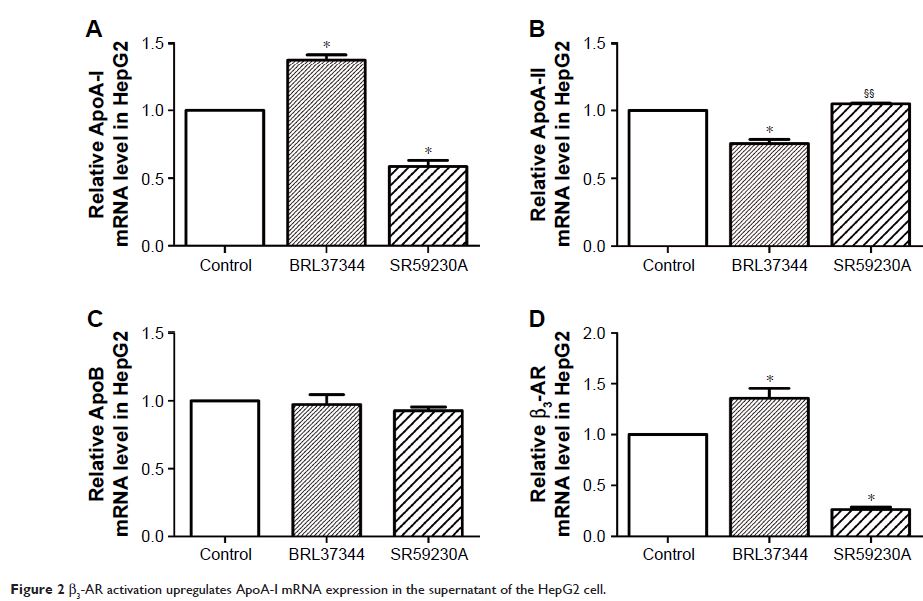109568
论文已发表
注册即可获取德孚的最新动态
IF 收录期刊
- 3.4 Breast Cancer (Dove Med Press)
- 3.2 Clin Epidemiol
- 2.6 Cancer Manag Res
- 2.9 Infect Drug Resist
- 3.7 Clin Interv Aging
- 5.1 Drug Des Dev Ther
- 3.1 Int J Chronic Obstr
- 6.6 Int J Nanomed
- 2.6 Int J Women's Health
- 2.9 Neuropsych Dis Treat
- 2.8 OncoTargets Ther
- 2.0 Patient Prefer Adher
- 2.2 Ther Clin Risk Manag
- 2.5 J Pain Res
- 3.0 Diabet Metab Synd Ob
- 3.2 Psychol Res Behav Ma
- 3.4 Nat Sci Sleep
- 1.8 Pharmgenomics Pers Med
- 2.0 Risk Manag Healthc Policy
- 4.1 J Inflamm Res
- 2.0 Int J Gen Med
- 3.4 J Hepatocell Carcinoma
- 3.0 J Asthma Allergy
- 2.2 Clin Cosmet Investig Dermatol
- 2.4 J Multidiscip Healthc

β3-肾上腺素受体激动剂上调 HepG2 细胞中载脂蛋白 A-1 的表达,这可能进一步促进巨噬细胞泡沫细胞的胆固醇流出
Authors Gao XQ, Li YF, Jiang ZL
Received 13 December 2016
Accepted for publication 25 January 2017
Published 3 March 2017 Volume 2017:11 Pages 617—627
DOI https://doi.org/10.2147/DDDT.S130088
Checked for plagiarism Yes
Review by Single-blind
Peer reviewers approved by Dr Rasika Samarasinghe
Peer reviewer comments 2
Editor who approved publication: Dr Tuo Deng
Objective: The aim of this study was to explore the effects of β3-adrenoceptor (β3-AR) activation
on HepG2 cells and its influence on cholesterol efflux from macrophage foam
cells.
Materials and methods: HepG2 cells were cultured and treated with the β3-AR agonist, BRL37344, and antagonist, SR52390A, and
the expression of apolipoprotein (Apo) A-I, ApoA-II, ApoB, and β3-AR in the supernatants and cells was determined.
The expression of peroxisome proliferator-activated receptor (PPAR) γ and PPARα
in the HepG2 cells was also assessed. Next, using the RAW264.7 macrophage foam
cell model, we also assessed the influence of the HepG2 cell supernatants on
lipid efflux. The cholesterol content of the foam cells was also measured, and
the cholesterol efflux from the macrophages was examined by determining 3H-labeled
cholesterol levels. Expression of ATP-binding cassette transporter (ABC) A1 and
ABCG1 of the macrophage foam cells was also assessed.
Results: β3-AR activation
increased ApoA-I expression in both the HepG2 cells and the supernatants; PPARγ
expression was upregulated, but PPARα expression was not. Treatment with GW9662
abolished the increased expression of ApoA-I induced by the β3-AR agonist. The HepG2 cell supernatants decreased
the lipid accumulation and increased the cholesterol efflux from the macrophage
foam cells. ABCA1 expression, but not ABCG1 expression, increased in the
macrophage foam cells treated with BRL37344-treated HepG2 cell supernatants.
Conclusion: Activation of β3-AR in HepG2
cells upregulates ApoA-I expression, which might further promote cholesterol
efflux from macrophage foam cells. PPARγ might be required for the induction of
ApoA-I expression.
Keywords: β3-adrenoceptor,
HepG2 cell, macrophage foam cell, atherosclerosis, cholesterol efflux, reverse
cholesterol transport
